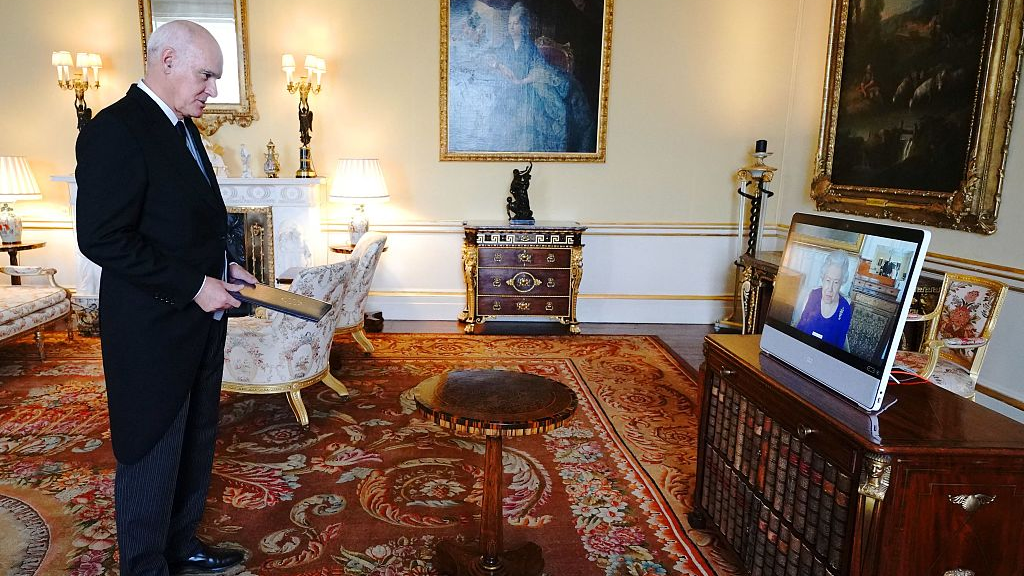
Britain's Queen Elizabeth II appears on a screen via videolink from Windsor Castle during a virtual audience to receive the European Union's Ambassador to the UK, Joao Vale de Almeida, at Buckingham Palace in London on October 19, 2021. /VCG
Britain's Queen Elizabeth II appears on a screen via videolink from Windsor Castle during a virtual audience to receive the European Union's Ambassador to the UK, Joao Vale de Almeida, at Buckingham Palace in London on October 19, 2021. /VCG
Editor's note: Jonathan Arnott is a former member of the European Parliament. The article reflects the author's opinions and not necessarily the views of CGTN.
At 2300 GMT on January 31, 2020, the United Kingdom left the European Union. It was the biggest constitutional change in the UK for a generation. As I write these words, approaching the second anniversary of that date, it feels as if time has stood still. The British referendum took place all the way back in 2016, and even then, it already felt like the debate had rumbled on for an eternity. To those on both sides of the debate, there has been an agonizing wait to find out what Brexit would actually look like. Due to the interference of the pandemic, some things still remain unclear.
There are three general opinions on Brexit in the UK. One group supported Brexit in principle and will never change; a slightly smaller group is so implacably opposed to Brexit that they would rejoin the EU if they could. The largest of the three strands of opinion is those who – whether they personally supported or opposed Brexit – consider the decision to have been made and that the UK must move forward.
First and foremost, the vote to leave the EU was not an economic decision. It was a political one, based around a belief that the laws of one nation should not be determined by 28 nations – a sense that global cooperation through the United Nations and other international organizations can be good but that, fundamentally, "European government" led to laws which were out of step with the British people. Outside the UK, it is the more clinical question of money and economic prosperity, which is the standard by which Brexit will ultimately be judged.
On that, the evidence is mixed. UK trade with the EU has declined to an extent, as expected. Some leading Brexiteers refused to admit that this would be the case, and they should have done so. Instead, they should have argued that the advantages would outweigh declining trade with the EU. To what extent, for example, does Brexit boost internal trade between UK businesses and individuals, with firms trading only within the UK no longer having to obey cumbersome EU rules? To what extent can a post-Brexit Britain boost its trade with non-EU nations? The Treasury's "Trade and Investment Core Statistics Book" shows that the top 10 growth nations for UK trade are non-EU nations. China, in particular, has grown both as an import and export partner for the UK in the last decade.

Cooked mainland UK Cumberland sausages bought in Northern Ireland and other mainland UK products alongside locally produced Northern Irish sausages. Negotiations between the EU and the UK have faltered on checks on some goods moving between the UK and Northern Ireland, United Kingdom, September 10, 2021. /VCG
Cooked mainland UK Cumberland sausages bought in Northern Ireland and other mainland UK products alongside locally produced Northern Irish sausages. Negotiations between the EU and the UK have faltered on checks on some goods moving between the UK and Northern Ireland, United Kingdom, September 10, 2021. /VCG
Looking at the nuts and bolts of the internal UK economy, Brexiteers have plenty to cherry-pick. They can point out that the pound is at near five-year highs against the euro and up roughly 5 percent against the dollar at the same time. They can point out that the UK's unemployment rate has fallen to 4.2 percent, compared with the eurozone's 7.2 percent. Equally, their opponents can point to the UK's skyrocketing debt to GDP ratio. In both cases, it is difficult to unpick the impact of Brexit from the impact of the pandemic.
Truth be told, so far, most of the trade deals agreed between the UK and countries around the world do little more than replicate existing deals. The agreement between the UK and New Zealand is welcome, and the agreement with Japan may be slightly broader in scope than the EU's, but these are far from sufficient to demonstrate the "added value" from Brexit, the "Global Britain" that Brexiteers speak of. Two years on, there is a ray of hope.
The EU's cumbersome processes were a huge source of frustration to me during my time in the European Parliament. Negotiations with India would periodically start, then ground to a halt. Negotiations between the EU and the Gulf Cooperation Council, including the United Arab Emirate and Saudi Arabia, have been ongoing for over 15 years without reaching a conclusion. Yet British and Indian officials already hope to complete a deal by the end of this year, and an agreement with the Gulf Cooperation Council (GCC) can be expected to follow shortly afterward. The Indian High Commissioner Gaitri Issar Kumar said India and the UK are "working towards concluding a comprehensive free trade agreement by December 2022 or early 2023, with an Interim Agreement as soon as possible."
The UK should, in theory, be able to act faster than the EU. As Richard Heald, chairman of the UK India Business Council, said, "Clearly a bilateral deal is easier to negotiate than one in which 27 members are involved and, there is some work to be done; it is based on some very sound foundations."
An agile UK, forging new relationships globally with China, India, the GCC and the Comprehensive and Progressive Agreement for Trans-Pacific Partnership, has every opportunity for success. But as the saying goes, the proof of the pudding is in the eating. Once again, we'll know it when we see it. Ironically, much of the delay was in negotiations with the European Union over the terms of departure. Even now, the thorny question of Northern Ireland has not been resolved. Such excuses cannot continue forever. The British government must conclude those agreements with haste. If it can do so, it will demonstrate long-term added value with rapidly-growing economies and secure a long-term legacy from Brexit.
I remain optimistic that Brexit will prove to be a long-term economic success and that the decision will not forever be seen as a trade-off between money and sovereignty, economy and politics. For now, patience is once again required. We await further developments.
(If you want to contribute and have specific expertise, please contact us at opinions@cgtn.com.)

